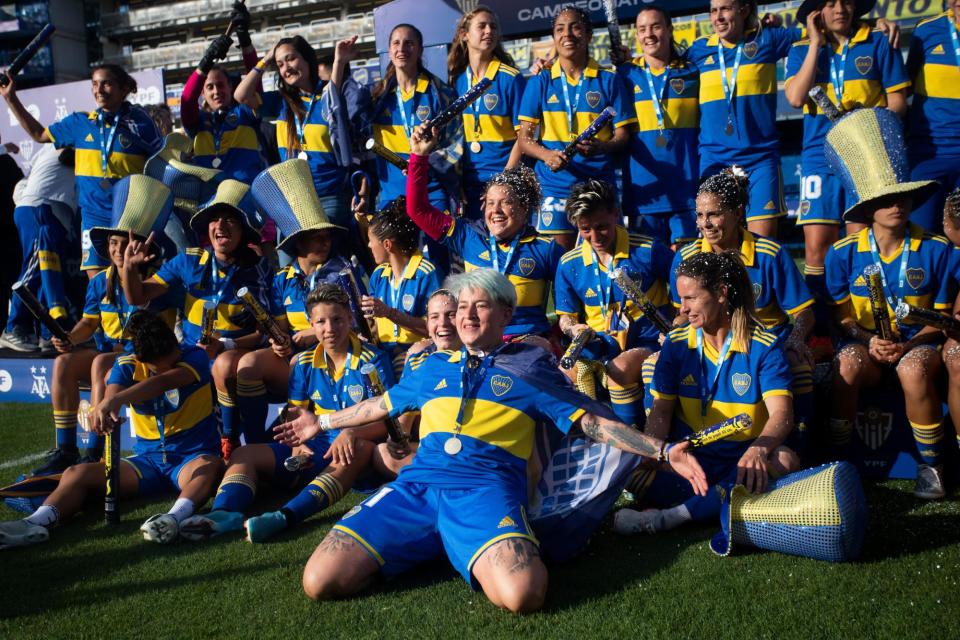Boca Juniors Women lead way in Argentina but bar needs raising further

Boca Juniors is undoubtably one of the most iconic clubs in South American football, whether on the men’s or the women’s side. Based in Buenos Aires, the women’s team have dominated domestically in the semi-professional era and won their fourth consecutive Argentinian end-of-year title in December.
However, all is not rosy. There are many challenges for women’s football in Argentina and that ends up having an effect on Boca’s results internationally. “Boca have made history, especially recently,” the Argentinian journalist Sofia Jaimez Bertazzo points out. “The level they have achieved individually and collectively is incredible and is not only reflected in the titles won but also in the players that go abroad from them.” One such example is Yamila Rodríguez, who was signed by the Brazilian side Palmeiras after the two clubs had played in the Libertadores final in 2022.
Related: The 100 best female footballers in the world 2023 – Nos 100-41
Although Argentinians are passionate about football it has taken decades for the women’s game reached some level of professionalism. It was not until 2019 that the country’s FA and the players’ union made the “professionalisation of the women’s game” official. Almost five years later, according to a report by Argentinian fact-checking agency Chequeado, more than 40% of players in the top division are still amateur. In fact, in 2023 none of the first division clubs had a 100% professional squad. Boca are one of five clubs to have over 20 professional players but the overall picture means that the level of the league, although improving, is still lower than the one in Brazil, for example.
Things are changing slowly and there has been an increase in interest in the women’s game among the public and the media. “Lately in Argentina the audience has changed and we see more fans in the stadiums when there are women’s games,” says Bertazzo. “And the last Women’s World Cup had a lot of attention in the media and a lot of journalists travelled to New Zealand and Australia to report on what was happening. This gives a lot of people an opportunity to get closer to the game.”
Argentina featuring in another Women’s World Cup this year was fundamental – and the public TV broadcaster, Televisión Pública, saw record-breaking audiences for Argentina’s group stage games at the tournament. Over the past few years, clubs in South America have increased their investment in women’s football. For national sides to improve though, as Bertazzo says, the decision-making process needs to change. “Basically, these are the leadership decisions that can see us do better internationally. It is a long process, but it is happening.”
It is clear that Boca are ahead of the curve at the moment – and they hope that the recent change in leadership may consolidate that success. In December, the former player Juan Román Riquelme won the elections to become president of the Xeneize. Days before the polls opened he attended Boca Women’s 2-0 win over Belgrano in which the club secured their second title of the year. Having a legend of the men’s team supporting the women’s team should be a good sign for the future of the Gladiadoras.
“Of course, he is such as strong icon in the club and in people’s hearts as a player but now we have to see how the leader Riquelme works. But expectations are high,” says Bertazzo. However, she prefers not to predict how Riquelme’s leadership will affect the women’s side. “I just can say that, as a Boca idol, he should continue to support his female players and to improve their conditions.”
And there is work to do. Boca’s Argentinian dominance is still not reflected on the international scene. An Argentinian side have never won the Copa Libertadores Femenina, the club competition for women’s sides in South America. In 2022, Boca reached the final against Palmeiras but lost the final 4-0. Of the 15 editions of the Libertadores, 12 have been won by a Brazilian club with Colombia, Paraguay and Chile claiming a title each. In 2023, Boca failed to reach the knockout stage, finishing third in their group.
“Having these international experiences gives Boca another perspective compared to other teams in Argentina. This increased international challenge demands that they improve to get results they want,” says Bertazzo. “The women’s game in Argentina needs better infrastructure, better salaries, sponsors for the national women’s team and more frequent camps and matches.”
The challenges are not only external. Boca have faced major changes over the past year and in April 2023, the former coach Jorge Daniel Martínez was accused of sexual abuse by a club employee. He denies the accusations but was replaced by the former player Florencia Quiñones, who went on to win the two national tournaments of the year. They were the team’s 27th and 28th national titles.
“We live in a region where football is still really ingrained into the masculine, but this has been changing,” says Bertazzo. “There are clubs, such as Boca, who decided to invest in their women, give them better conditions and have more professional players in the squad. That raises the bar.”
Get in touch
If you have any questions or comments about any of our newsletters, please email moving.goalposts@theguardian.com.
This is an extract from our free weekly email, Moving the Goalposts. To get the full edition visit this page and follow the instructions.

 Yahoo Sport
Yahoo Sport 


































































